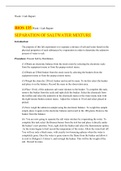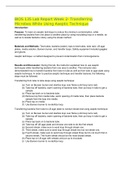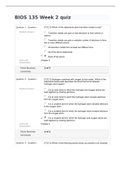Bios 135 week - Study guides, Class notes & Summaries
Looking for the best study guides, study notes and summaries about Bios 135 week? On this page you'll find 53 study documents about Bios 135 week.
Page 2 out of 53 results
Sort by
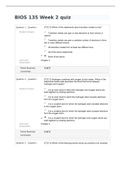
-
BIOS 135 Week 2 Questions and Answers Verified and Rated A+
- Exam (elaborations) • 5 pages • 2023
- Available in package deal
-
- $11.49
- + learn more
BIOS 135 Week 2 Questions and Answers Verified and Rated A+
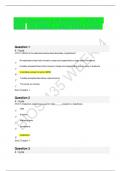
-
BIOS Question and Answers LATEST 2024 135 WEEK 4 MIDTERM EXAM
- Exam (elaborations) • 14 pages • 2024
- Available in package deal
-
- $7.99
- + learn more
BIOS Question and Answers LATEST 2024 135 WEEK 4 MIDTERM EXAM
BIOS 135 Week 1 Lab Report SEPARATION OF SALTWATER MIXTURE
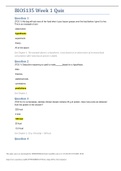
-
BIOS 135 Week 1 Quiz (Multiple Choice & Short Questions) | 100% CORRECT ANSWERS | DeVry University
- Exam (elaborations) • 4 pages • 2022
-
- $10.99
- + learn more
Question 1 (TCO 1) My dog will eat more of her food when I pour bacon grease over the food before I give it to her. This is an example of a(n) observation. hypothesis. experiment. theory. All of the above See Chapter 1. The example above is a hypothesis. It was based on an observation of increased food consumption after tasty bacon grease is added. Question 2 (TCO 1) Deductive reasoning is used to make based on a hypothesis. data theories statistical tests correlations predictions...
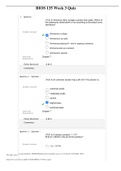
-
BIOS 135 Week 3 Quiz (Multiple Choice & Short Questions) | Download To Score An A
- Exam (elaborations) • 2 pages • 2022
-
- $10.99
- + learn more
1. Question : (TCO 4) Ammonia (NH3) accepts a proton from water. Which of the statements listed below is true according to Bronsted-Lowry definitions? Student Answer: Ammonia is a base. Ammonia is an acid. Ammonia produces H+ ions in aqueous solutions. Ammonia acts as a solvent. Ammonia is neutral. Instructor Chapter 7 Explanation: Points Received: 2 of 2 Comments: Question 2. Question : (TCO 4) An unknown solution has a pH of 8. This solution is Student Answer: extremely acidic. moderately acid...
BIOS 135 Lab Report Week 2- Transferring Microbes While Using Aseptic Technique
BIOS 135 Week 2 quiz
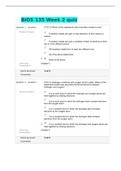
-
Grad BIOS 135 Week 2 quiz e Details - All Questions
- Exam (elaborations) • 5 pages • 2022
-
- $12.49
- + learn more
Grading Summary Grad BIOS 135 Week 2 quiz e Details - All Questions Question 1. Question : (TCO 3) Which of the statements about transition metals is true? Student Answer: Transition metals can gain or lose electrons to form anions or cations. Transition metals can gain a variable number of electrons to form two or more different anions. All transition metals form at least two different ions. All of the above statements None of the above Instructo...
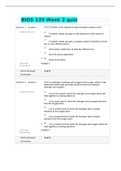
-
Grad BIOS 135 Week 2 quiz e Details - All Questions
- Exam (elaborations) • 5 pages • 2022
-
- $12.49
- + learn more
Grading Summary Grad BIOS 135 Week 2 quiz e Details - All Questions Question 1. Question : (TCO 3) Which of the statements about transition metals is true? Student Answer: Transition metals can gain or lose electrons to form anions or cations. Transition metals can gain a variable number of electrons to form two or more different anions. All transition metals form at least two different ions. All of the above statements None of the above Instructo...
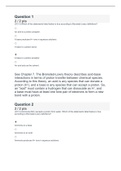
-
BIOS 135 Week 3 Quiz (Latest Version) Questions with Answers.
- Exam (elaborations) • 13 pages • 2021
-
- $15.40
- + learn more
Question 1 2 / 2 pts (CO 3) Which of the statements listed below is true according to Bronsted-Lowry definitions? An acid is a proton acceptor. A base produces H+ ions in aqueous solutions. A base is a proton donor. Correct! A base is a proton acceptor. An acid acts as the solvent. See Chapter 7. The Brønsted-Lowry theory describes acid-base interactions in terms of proton transfer between chemical species. According to this theory, an acid is any species...

That summary you just bought made someone very happy. Also get paid weekly? Sell your study resources on Stuvia! Discover all about earning on Stuvia

